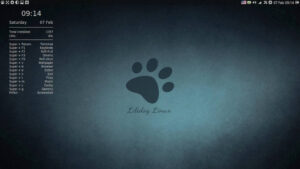FOSS Week in Review
Also: We hear more from DuckDuckGo about its open source donations and welcome Robin “Roblimo” Miller to the FOSS Force team.
While the big news in FOSS media this week was the Ubuntu Online Summit, I wasn’t there. Too far to travel. However, the big news seems to be that Mir and Unity 8 won’t be the defaults when Canonical ships Ubuntu 16.10 on October 20, although both “will be available as an ‘alternative session,’” according to OMG! Ubuntu! Ho-hum. Now on to some real FOSS news…

By chensiyuan (chensiyuan) [GFDL (http://www.gnu.org/copyleft/fdl.html) or CC BY-SA 4.0-3.0-2.5-2.0-1.0 (http://creativecommons.org/licenses/by-sa/4.0-3.0-2.5-2.0-1.0)], via Wikimedia Commons
According to Motherboard: “[I]n 2014, Hong Kong’s Occupy Central movement used a meshnet app called FireChat to message each other and organize in the event that the Chinese People’s Liberation Army shut down the island’s Wi-Fi. (A government-sanctioned shutdown never happened.) Other Occupy movements, such as the one in NYC, also experimented with meshnets.”
As we used to say back in the day: Power to the people.
On Wednesday, FOSS Force reported on DuckDuckGo’s contributions, totaling $225,000, to nine separate open source projects. Since the article went online, we’ve heard from Daniel Davis, who has filled us in on some more details about the annual project that each year offers cash awards to open source projects.
“We started the initiative in 2011 with six recipients, and each year the amount we’ve been able to donate has increased as our userbase has grown.
“It started with wanting to give something back to some of the open source projects we use so much, either directly or indirectly. In terms of deciding the recipients, until last year we let the community allocate half of the donations and staff would decide the remainder. This year, however, we accepted community nominations for all the donations and then staff decided on the final recipients.
“We also now have a theme each year — 2015 was ‘mainstream privacy’ and this year’s is ‘raising the standard of trust online,’ which aligns with our vision.”
Currently, DuckDuckGo reckons it performs over ten million user initiated searches daily, up from about 600,000 at this time in 2012.
Quote of the week: This week’s quote is lifted directly from a headline that appeared Sunday on ZDNet: “Pirate Bay visitors infected with crypto-ransomware via bad ads.”
I wonder why that doesn’t surprise me? Actually, I don’t wonder at all.
Another day, another distro: This week’s new distro releases start with one that’s officially sanctioned by FSF. gNewSense 4, based on Debian 7, certainly isn’t cutting edge — uses the GNOME 3.4 desktop, Linux 3.2 kernel, LibreOffice 3.5 — but gets a thumbs up for respecting software freedom…. Based on Xubuntu 16.04, Voyager 16.04 has been released featuring — what else? — the Xfce desktop…. 4MLinux 17.0, a miniature distro designed to be used as a rescue live CD, for playing videos and audio files or as a miniserver was released Sunday…. Also on Sunday: the release of version 2016.04.28 of BlackArch Linux, a penetration testing distro…. And Saturday saw the release of SparkyLinux 4.3, based on the “testing” branch of Debian and featuring customized lightweight desktops such as Enlightenment, LXDE and Openbox.
Finally, I guess this technically qualifies as a distro too: On Sunday GParted Live 0.26.0-2 was released.
Quick takes: Another edition of the Energizer Bunny of office productivity suites has arrived with the release of version 5.0.6 of LibreOffice. This will be the last maintenance release of the 5.0 series. A 5.1 minor point maintenance release, 5.1.3, is due May 15.… And according to an article published Monday on TechRepublic, we might soon be seeing “run flat” hard drives that will, unintuitively, continue to work even after they fail.
Parting shot: Many of you probably know that for the last many years Robin “Roblimo” Miller has produced a regular video interview feature over at Slashdot. Those with an even longer memory will remember when he was the editor of a host of popular news sites, including SourceForge, freshmeat, Linux.com, NewsForge, ThinkGeek as well as Slashdot. Now, we’re proud to say, Miller has agreed to bring his video interviewing skills to FOSS Force on a weekly basis. Look for him every Thursday. And in case you missed it, check out his FOSS Force video premier, an interview with SouthEast LinuxFest’s Jeremy Sands that went up yesterday.
That does it for this week. Until next time, may the FOSS be with you…
Christine Hall has been a journalist since 1971. In 2001, she began writing a weekly consumer computer column and started covering Linux and FOSS in 2002 after making the switch to GNU/Linux. Follow her on Twitter: @BrideOfLinux










“Another edition of the Energizer Bunny of office productivity suites has arrived with the release of version 5.0.6 of LibreOffice.…”
I’m currrently running 5.1.2.2, and it seems very stable.
Use Pirate Bay (or any other site) with AdBlocker Plus and NoScript.
…also don’t run Windows.
Funny how that story tries to paint pirating as dangerous, when it’s the stupid advertising networks that are dangerous. You’re just as likely to get hit by crypto ransomware on a major news site or social network.
“You’re just as likely to get hit by crypto ransomware on a major news site or social network.”
Indeed, and once again the solution is the same as for accessing TBP… Adblock+ and NoScript and never ever us Microsoft Windows.
Actually, for most people the danger is accessing major news sites, and their favourite Social Network site.
2 other good addons are EFF’s Privacy Badger and HTTPS everywhere
On another subject, I have to make a quick comment re SparkyLinux. First impression, it’s very good. I’m prepping a computer for a high school to use with a large-format flatbed SCSI scanner. The computer is a Dell Dimension E521 with 4GB RAM, an NVidia GeForce 7300 GS, and an Adaptec AHA-2930CU SCSI card. I initially tried LXLE, but encountered display problems having to do with Plymouth apparently. I did the recommended hack, but the problem continued. Then Sparky was released. I haven’t had very good luck with any Ubuntu-based distros so when I saw Sparky is Debian-based, I bailed on LXLE and burned a Sparky DVD. Wow! What a switch! It installed faster and without a hitch. It boots quick. Snappy UI response. SCSI and scanner recognized and running as expected. And no display issues. And I’ve restarted the system several times over the last week or more. That Dimension pops up each and every time ready to go. Next I’ll be trying Sparky on another machine that’s even older. So, if you have an older machine from which you’re trying to get more use, check it out.
It’s Raspberry Pis not Pi’s. Tut
@Mr. Sometimes the autopilot that guides my typing fingers plays bad. Thanks for the catch. Fixed. 🙂
I have read about new Ubuntu.
It looks like some of the things are not so great>
First thing that you need to folow is that if something is working properly don’t change it. Microsoft has done some bad things with 8 and he had to pay a lot for it.
I don’t believe it would be same error by Ubuntu guys, and now when we need somethig that works for sure…
So, that people who switch from Microsoft to Linux don’t have first bad experience…